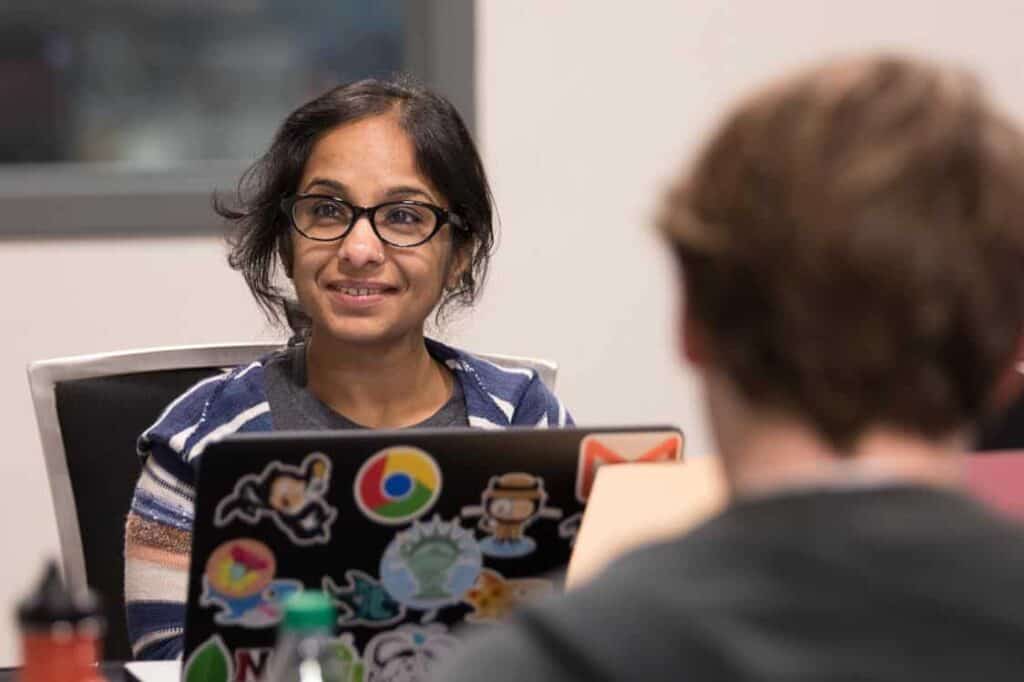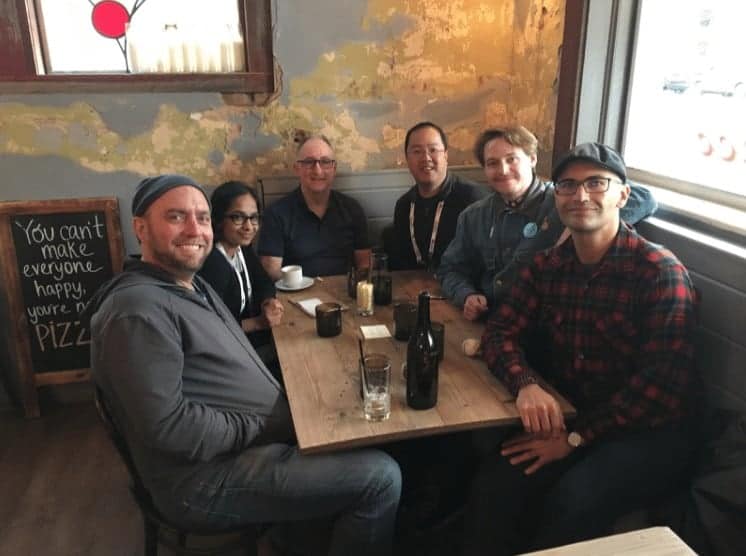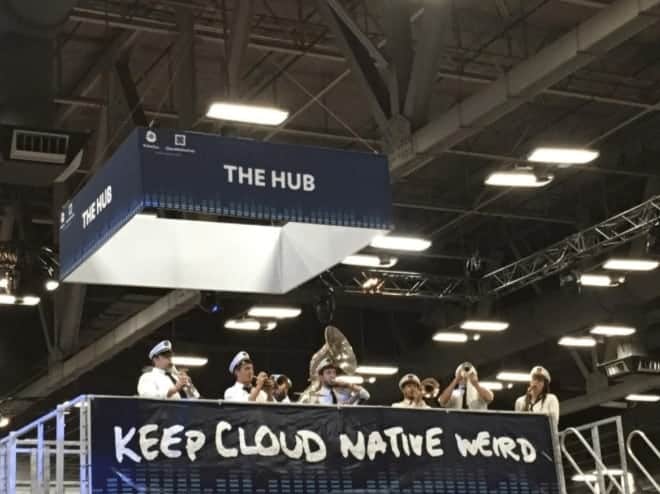CNCF offered 103 diversity scholarships to developers and students to attend KubeCon + CloudNativeCon North America 2017. In this post, our scholarship recipient Radhika Puthiyetath, Technical Writer at AppDynamics (part of Cisco Systems), shares her experience attending sessions and meeting the community. Anyone interested in applying for the CNCF diversity scholarship to attend KubeCon + CloudNativeCon Europe 2018 in Copenhagen May 2-4, can submit an application here. Applications are due March 2nd.
By Radhika Puthiyetath, Senior Information Developer at AppDynamics (part of Cisco Systems)

Radhika Puthiyetath is crafting information experience for the Business IQ product lines at AppDynamics (part of Cisco). Radhika was the Release Notes Lead for the Kubernetes 1.8 Release. Prior to Kubernetes, she had actively been involved in Apache Software Foundation, GNOME, and OpenSUSE.
The term “Unity in Diversity” refers to the state of oneness despite the presence of Diversity of all kinds. The oneness ensures the presence of, participation by, and respect for people of different interests, backgrounds, and experience. An empathetic and diverse community fosters inclusiveness. Open Source (OS) communities in general uphold their commitment to this philosophy. Talking of OS communities, Kubernetes is probably the second largest of all times, in terms of code contribution and participation. Contributors belong to different organizations with diverse interests, dabbling in different languages, focusing on different components, coexisting in harmony and contributing to a common goal–Kubernetes. Reflecting its sheer size and impact, the Kubernetes community went many steps further at championing Diversity and Inclusion in almost all aspects of community ecosystem.
The apotheosis of all OS communities, Kubernetes, under the aegis of CNCF, outshined its peer communities in its commitment to “Unity in Diversity.” CNCF granted Diversity Scholarship to all 103 applicants to attend KubeCon + CloudNativeCon 2017 in Austin, Texas. In partnership with CNCF, major cloud infrastructure incumbents, namely AWS, Google and Microsoft, as well as Twistlock jointly extended a combined $250,0000 grant to support the Diversity Scholarships. The grant helped Kubernetes enthusiasts belonging to underrepresented groups attend the most anticipated conference of the year. As such, KubeCon + CloudNativeCon 2017 emerged as an unprecedented representation of “Unity in Diversity.” More than 4,100 people from across the globe, representing 100 plus organizations, flocked to the Austin Convention center in drove, for the love of the technology that powers the infrastructure of organizations of all size. I was one of those fortunate attendees–thanks to the Diversity Scholarship. Having been through the wringer in the recent past, I was badly in need of a morale boost. Finding my name among the 30 applicants who were awarded the Scholarship in the first round gave my sagging morale a boost.
Just got the KubeCon+CloudNativeCon 2017-Diversity Scholarship acceptance email 🍾🍾
— ~ Radhika ~ (@radhikapc) November 4, 2017
Thank you @kubernetesio @CloudNativeFdn @linuxfoundation
A little about me and my open source journey
I identify myself as a woman in tech. I also represent technical writers who are as passionate as their engineering peers about technology and customer success, and yet are given the least preference when it comes to technical conferences and customer interaction. Diversity Scholarship enabled me to meet the team I closely collaborate with, whom I otherwise meet only on virtual forums. In a tech conference of this magnitude, sadly, I met only a handful of technical writers, all of them representing SIG-Doc. I sincerely hope my participation inspire my peers to utilize similar opportunities. I also hope organizations acknowledge the significant contributions of technical writers towards customer success and give them equal opportunities as their engineering peers to attend technical conferences. I am grateful that the Diversity committee recognized my identity, as a woman in tech as well as a technical writer, both under-represented groups in technical conferences. Talking about my OS journey, I embarked on this exciting jaunt at Novell dabbling in GNU Texinfo. The gratifying ride continued with GNOME (Evolution), OpenSUSE (iFolder), Apache Software Foundation (CloudStack), and CNCF (Kubernetes), every bit of which I cherish. I have participated ebulliently in GNOME Evolution and ASF CloudStack efforts for almost five years in various capacities, whereas in Kubernetes only for about five months at the time of attending Kubecon. I started contributing as the Kubernetes 1.8 Release Team member leading the effort of Kubernetes Release Notes. I also assisted the SIG-Doc team with organizing the Documentation Sprint at Kubecon and have a handful of PRs merged. The most delightful experience of all was hosting a Kubernetes community meeting.
The Kubernetes community
Empathetic–that’s the most meaningful adjective I can think of. Though I had no solid credentials in Kubernetes, the community leads extended to me the opportunity to host a community meeting and to attend the Contributor Summit at Kubecon. My experience alone bespeaks the emphasis the community has placed on Openness, Diversity, and Inclusion. The community is indeed an embodiment of the philosophy of “Unity in Diversity”, where contributors representing competing organizations support each other despite their professional association.
https://twitter.com/jessfraz/status/939679863170129920?ref_src=twsrc%5Etfw%7Ctwcamp%5Etweetembed%7Ctwterm%5E939679863170129920%7Ctwgr%5Eshare_3&ref_url=https%3A%2F%2Fdev-cncf.pantheonsite.io%2Fblog%2F2018%2F01%2F30%2Fdiversity-scholarship-series-unity-diversity-kubernetes%2FContributor summit
The Kubernetes Contributor Summit, serving as a curtain raiser to the most anticipated conference of the year, was held on December 5. At the helm of the summit was Paris and Jorge, who opened the day with a detailed agenda to highlight what the audience could expect from the day ahead. Their friendly, indefatigable efforts set the tone for a high-energy, well-run summit. After the serious discussions around Kubernetes roadmap, the group broke for Unconferencing sessions.
“If Governance committee is steering wheel, contributors are the engine” @jbeda at the Contributor Summit @kubeconio 2017
— ~ Radhika ~ (@radhikapc) December 5, 2017
Here are some bites from the “Onboarding developers through better documentation” track led by the SIG-Doc lead Jared Bhatti. One common theme resonated across attendees was “Good documentation put a stop to people repeating the same question” and “Identifying the ‘big nouns’ and related ‘big verbs’ for documenting”. The attendees united to raise voice to find ways to avoid content that no longer work. Jared kicked the discussion up a notch by elaborating how Andrew’s project on Crafting User Journeys and other projects solve many of these issues. The session wrapped up by calling participation in ongoing discussion to improve information experience. The session was astoundingly energizing time – I am really glad that we’ve had such a lively, engaging discussion. Personally, summit presented an incredible opportunity to me to meet the Governance body members and the Executive Director of CNCF, Dan Kohn himself. Dan was kind enough to share the success story of a Diversity Scholarship recipient, Kris Nova, and provide me with a mini-mentoring session. I’d also received a mini-mentoring session from the CEO of Rancher Labs, Sheng Liang on the last day of the conference. The co-creator of Kubernetes, Joe Beda, was kind enough to give me a signed copy of his book. Though I’d served the length and breadth of other OS projects such an opportunity was my first. I realized how accessible, approachable, and humble the leadership is.
Documentation Sprint
With Kubernetes doc maintainers

The Special Interest Group (SIG) for Kubernetes Documentation pulled together a Docs Sprint at KubeCon+CloudNativeCon. Ideas are worthless without execution by a team able to execute well. When Jared Bhatti asked us for ideas for Kubecon I’d never thought one of my suggestions, running a doc hackathon, would be considered for execution. Many thanks to the team for leading the effort and pulling off such a memorable event. The sprint included two tracks, improving user journeys and expanding the existing Kubernetes glossary to cover a broader range of terms. However, participants, though from diverse backgrounds, unanimously decided to focus on expanding the Kubernetes glossary. More than 30 terms have been added to the glossary in the event.
EMPOWHER evening event
On Tuesday night of the Kubecon, ladies at the conference shed our nerdy duds and transformed ourselves into glamorous red-carpet stars. The EMPOWHER Evening Event, sponsored by Nutanix, was all about dine and shine. Personal highlight of the event was meeting with Ria Bhatia, whose YouTube channel, devops & socks, I enjoy watching.
Takeaways from Kubecon sessions
I took invaluable insights from several sessions. I’ll describe my personal highlights that resonated with me. Of all the talks, my favorite one is Brian Grant’s session, What is Kubernetes, An Architectural View, and I rank it among the top 3 I’ve seen at Kubecon. The session was a dense whirlwind tour on defining Kubernetes in ten different ways–from the familiar ‘container orchestrator’ to unfamiliar terms, such as Portable Cloud Abstraction. I found it fascinating that Kubernetes has been used as a toolkit for machine learning platforms. I also learned how Kubernetes is similar to and different from IAAS platforms Distributed Networking is my favorite domain. Because I’ve had a chance to document Network Policies and to play around with Calico a bit, I’ve been following Ahmet Alp Balkan’s work and his blog series on the same topic. I can’t emphasize how meticulous Ahmet is about explaining the concepts and giving a superior information experience with carefully chosen fonts and elaborately created illustrations. The same watchful attention to details is reflected on the slides of his talk, Kubernetes Network Policies. I thoroughly enjoyed Brendan Burns talk on Metaparticle–A standard library for cloud-native development, which aids developers design, develop, and deploy their application from a single, easy to use environment. I did not miss to go over the tutorial page post Kubecon. It’s also intriguing to learn that Kubernetes landscape has expanded further with Intel’s Kata Containers and Amazon’s Elastic Container Service for Kubernetes (EKS).
Austin downtown
The Austin Convention Center is not far from the north banks of the Colorado River. On the first day of reaching Austin, I grabbed Nikitha and headed over to Zilker Park, a few blocks of the Convention Center. Taking a winter evening stroll around Downtown and along the banks got me into the vibe of the city and soaked me up the riparian environment. After witnessing a gorgeous sunset and spectacular cityscape vistas, we returned. The beautiful city lights unfolded around us as we walked back to our respective hotels. Most attendees roomed at hotels in close proximity to the Convention Center and I bumped into a lot of folks flaunting their Kubernetes Jacket.
Final thoughts
The mantra of KubeCon + CloudNativeCon 2017 was “Keep Cloud Native Weird.” Flooded with energizing air, the motto reverberated throughout the length and breadth of the conference, keeping it unconventional and outré in every sense. The most unconventional and “weird” fact about KubeCon + CloudNativeCon 2017 was that the community was United in Diversity.
